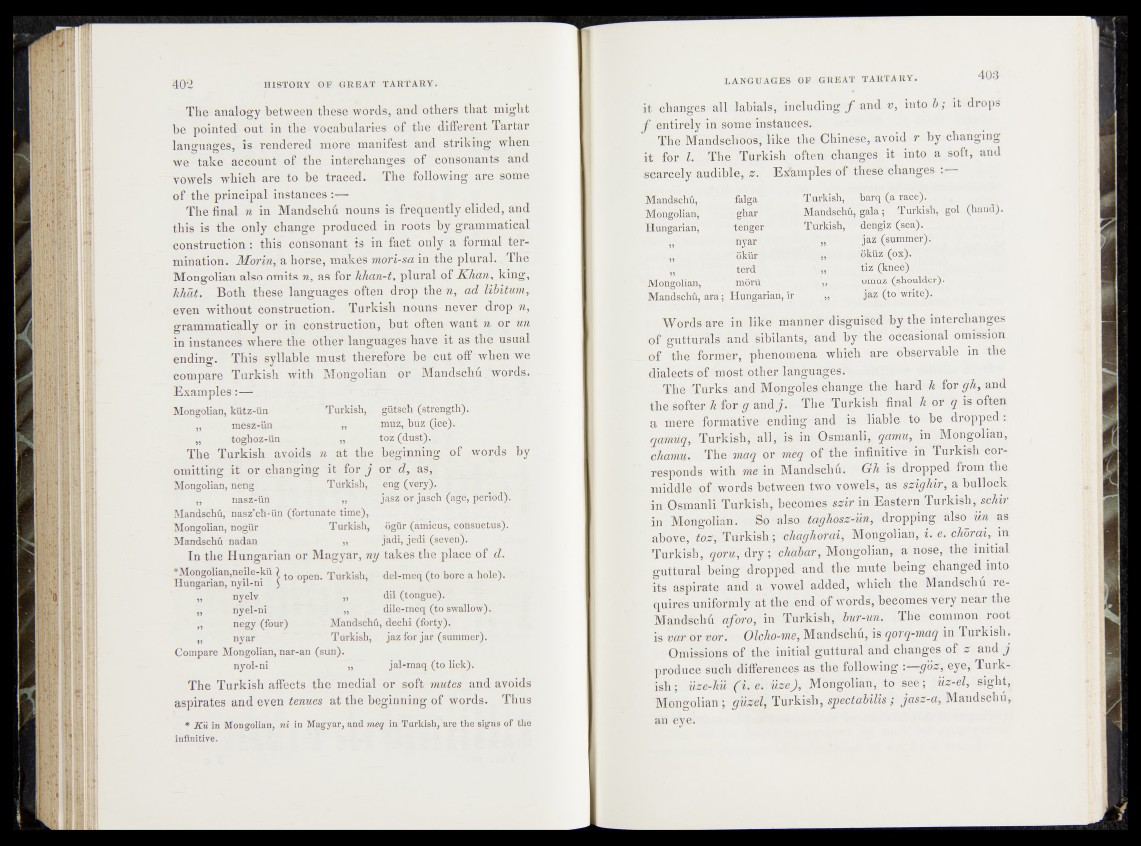
The analogy between foese words, and others that might
be pointed out in the vocabularies- of the different Tartar
languages, is rendered more manifest and striking when
we take account of the interchanges ofjTcohsonants and
vowels which are to be traced.- The following are somè
of the principal instances :—
The final n in Mandschü nouns is frequently eljded, and
this is the only change produced ~M roots by grammatical
construction: this consonant is in fact ooJy a formal ter-'
minatioH, Morin, a horse, makes mori-sa in the plural. The
Mongolian also omits n, as for khan-t, plural of Khan, king,
hhat. Both these languages often drop the n, ad libitum,
even without construction. Turkish^nouns never drop n,
grammatically or in construction, but often-want n or un
in instances where the other languages have it as the usual
ending. This syllable must therefore. Jae cut off |wjien w|
compare Turkish with Mongolian or Mandschu„ words.
Examples:—
Mongolian, kutz-ün ' ' Turkish, giitseh (strength).
,, mesz-iin — . \ mim, buz fee)..
„ toghoz-iin ... „ toz (dust).
The Turkish avoids n at the beginning of wo|ds hy
omitting it or changing it for j or d, as,
Mongolian, neng , Türkish, eng (very).
„ nasz-iiö „ jasz-or jasch "(ag4 |e rp ï|r 1
Mandschu, nasz’ch-iin (fortunate time),
Mongolian, nogiir Turkish, ëgür (atoicas, ttmsuefcus).
Mandschu nadan „ jbdi,'jedl (ssvenj.
In the Hungarian or Magyar, ny takes the place of d.
*Mongolian,neile-kü
to open. Turkish, del-meq (to bore a hole).
Hungarian, nyil-ni
„ nyelv
^ nyel-ni
„ negy (four)
„ nyar
I l l . dil (tongue).
K:»}' - dile-meq (to swallow).
MandscM, dechi (Ibrjy)|if
Turkish, jazfor jar (summer).
Compare Mongolian, nar-an (sun),
nyol-ni jal-maq (to lick).
The Turkish affects the medial or soft mutes and avoids
aspirates and even tenues at the beginning of words. Thus
* Ku in Mongolian, ni in Magyar, and meq in Turkish, We the signs of the
infinitive.
it changes all labials, M o ld in g / and' v, into b; it drops
ƒ entirely in s'om^instances1.' >'■* u’ 1'
The Mandleh|fpl^like,'rtke Chinèse, avoid r hy.cchanging
it for l. The ’Turkish ofbenrdh^i^f it into a soft, and
-scarcely auditjle^i^. 't^es^ changes :
•Mandschu,~ ~ falga '
Mongoli ç iW R l . ' ^ghar '
Hungarian, tenger
H H H [ I I H h
„ . . .■ ' oTiur^
' * *,* ■ *!
Mandschu, ara ; Hungarian, if
Tjmkhfift barq (a race); 'e
Mandsehujigala ; TurMsh, ^ol (hand).
TnftidhJ; ’déngiz1 (sea), ^
flHHNj I.
„ öküz (ox). Y
H I ombz ( stolaiB-i'
* ü - " :
-Words-are in like manner ffisguisedr by the interchanges
of gutfhrals and dfolaltfjj; a n d ^ ^ ^ P i ^ M a a l omission,
of the formfer, pheh^feena whjch are^fobservabl^-in the
dialects- of/móst-other lahifulg^s^
- Th^Turks and Mopg41e0 cha#g&!the hard k for gh, and
théisofter A for g and ) . The Turkish final; or q is often
a foérè formative’--ending and./liable-ffor-be d ip p ed :
qamiiq, Turkishv a?T>i fofo O s m a n l i ^ ’
ehamu. The maq or meq Bft'fte Sllnitive in Turkish corresponds
with me in Mand^chujÈ Oh fo droppMl.from the
middtte-of words between two vowels,-as szigliir', a bullock
in Osmanli Turkish /becomes- szw in Eastern Turkish,:scAw:
in Mongolian, So--afea*’ta^o«*-^'Üropping also-mn, as
above, toz, Turkish; chaghorai, Mong#|an, i. e. choral, in
Turkish, qoru', dry ych'abar, Mongolian, a nose, théanitial:
guttural befog dropped and the mute b e in g changed into
its aspirate and a vowel addelfc, - which the. Mandschu requires
uniformly at the end of words,vbecomes vëry .near the
Mandschd aforo, in Turkish, Jmihuh.; The - common, root
is var or vor. Olcho-me, Mandschu, is qorq-maq in Turkish-.
Omissions of /the initial guttural and changes of £ and j
produce such differences as the following eye, Turkish;
üze-hü (i. e. iize^ Mongolian, fo 'Sè'e'; üz-el, sight,
Mongolian ; guzel, Turkish, spectabilis ; jasz-a, Mandschu,
an eye.